Pharmko's custom nutrition formulations
Understanding the Rise of Customized Nutrition
In recent years, personalized nutrition has emerged as a groundbreaking approach to health management, offering tailored solutions that address individual biological, metabolic, and lifestyle differences. This revolution is supported by advances in nutraceuticals, clinical research, and digital health tools. Pharmko, a leader in this domain, specializes in creating customized nutrition formulations that leverage the latest scientific and technological innovations to optimize health results across various populations, including humans and animals.
Overview of Pharmko's Custom Nutrition Formulations and Their Unique Features
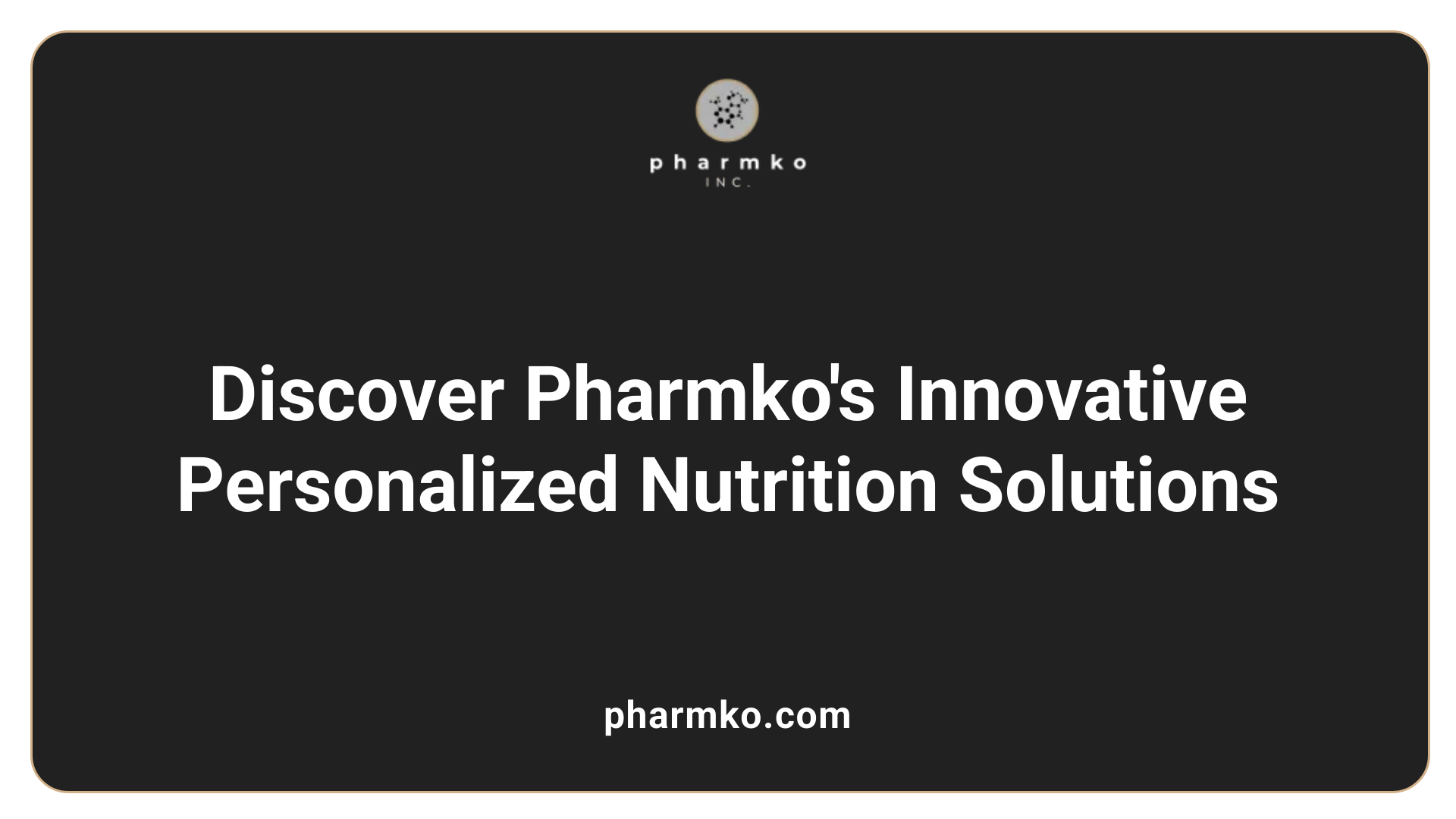
What are Pharmko's custom nutrition formulations and what are their unique features?
Pharmko specializes in crafting personalized nutrition solutions tailored to meet the specific health needs of different patients. These custom formulations integrate high-quality ingredients, ensuring safety and efficacy. A notable example is their development of advanced lipid emulsions, which are used in parenteral nutrition (PN).
One of their significant innovations is the support for pediatric patients with PNAC (parenteral nutrition-associated cholestasis), exemplified by the development of Omegaven, the first fish oil-based lipid emulsion approved in the US for children with this condition. Previously limited to compassionate care, Omegaven now provides a scientifically validated, safer alternative for young patients.
For adult patients, Pharmko offers the first 3-chamber bag (Kabiven/Perikabiven) designed to simplify PN delivery, enhancing safety and reducing errors. They also produce SMOFlipid, the first 4-oil lipid emulsion available in the US that fosters better metabolic responses, approved for both adults and preterm neonates based on robust clinical evidence.
Throughout its offerings, Pharmko emphasizes safety features such as the use of high-quality ingredients and formulations that are adaptable to individual needs. Their commitment to scientific validation ensures that these formulations are both safe and effective, supporting optimal health outcomes across diverse patient groups.
| Product Name | Target Patients | Composition Features | Notable Benefits |
|---|---|---|---|
| Omegaven | Pediatric with PNAC | Fish oil-based lipid emulsion | Approved for children with PNAC, supports liver health |
| Kabiven/Perikabiven | Adults | Three-chamber bag for PN delivery | Streamlined safety and delivery for adult patients |
| SMOFlipid | Adults and preterm neonates | Four-oil blend lipid emulsion | Supports safety and efficacy backed by clinical data |
| Intralipid | General use (since 1962) | Soybean oil-based lipid emulsion | Widely used, over 200 million infusions globally |
This overview underscores Pharmko’s dedication to advancing individualized parenteral nutrition solutions with innovative formulations, high safety standards, and scientifically validated efficacy.
Development and Customization Processes in Personalized Nutrition
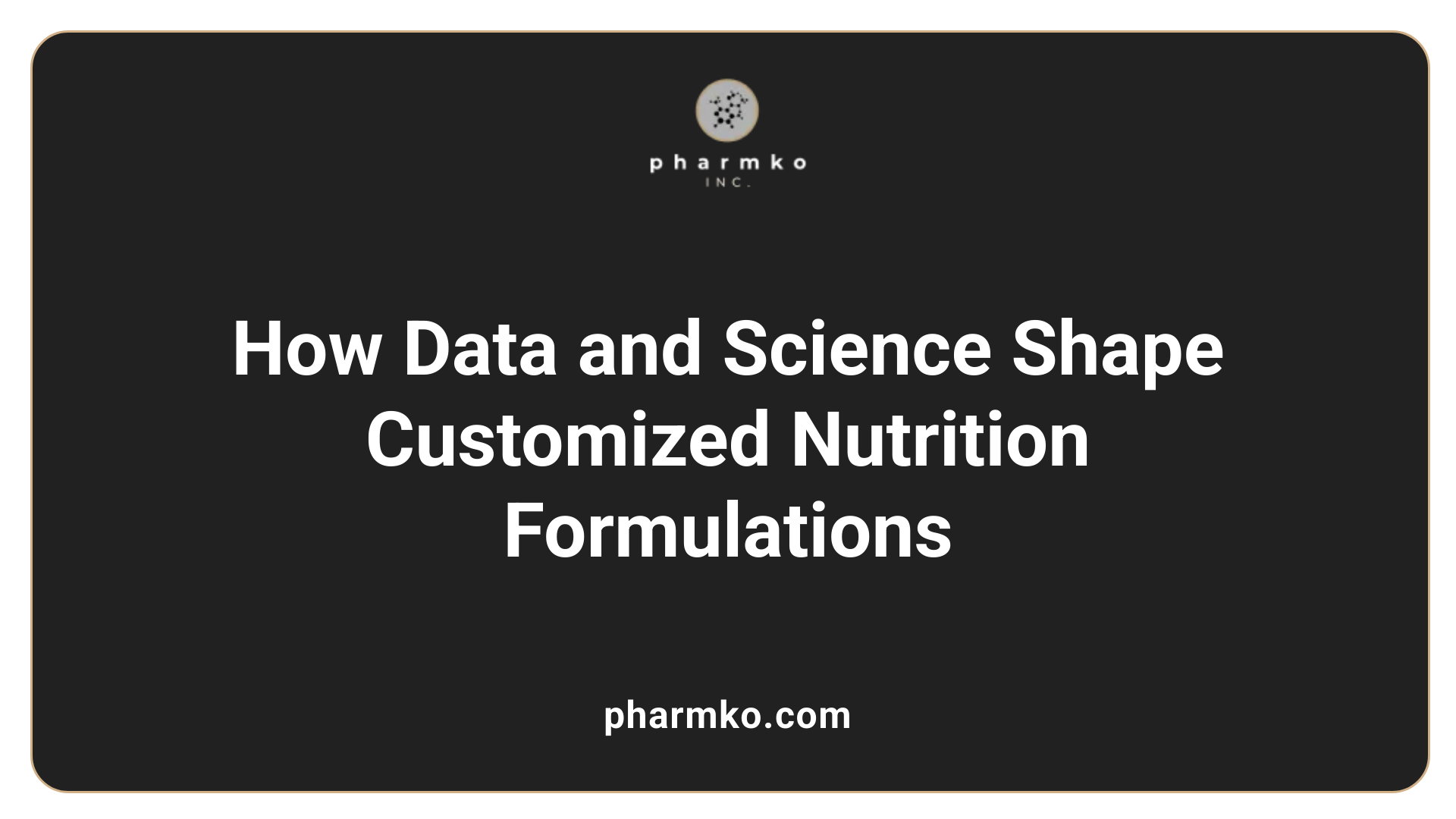
How are personalized nutrition formulations developed and customized?
Personalized nutrition relies on a detailed process that integrates various types of data to create tailored dietary recommendations. Initially, comprehensive data collection is undertaken, capturing biological details such as genetic markers, health biomarkers, and clinical parameters. Lifestyle information, including physical activity, dietary habits, and environmental exposures, is gathered through validated digital tools, sensors, and questionnaires.
Once data are collected, they are analyzed using evidence-based models and algorithms. These computational tools, like health space models and Bayesian Belief Networks, evaluate individual health status and nutritional needs. This step ensures that formulations are scientifically grounded and specifically suited to each person.
The formulation process then involves translating insights from the data into personalized advice. This includes feedback on current nutritional intake, health-oriented suggestions, and practical steps for dietary improvement. Recommendations are communicated visually and engagingly, often incorporating motivational techniques to encourage adherence.
The development of these tailored formulations emphasizes critical elements such as scientific validation, data integrity, transparency, and privacy protection. By continuously collecting real-time data, digital health tools enable ongoing adjustments, making dietary guidance dynamic. This approach supports meaningful behavior change, ensuring that nutrition plans adapt as individuals’ needs evolve, ultimately promoting better health outcomes.
Ingredients and Components in Customized Nutritional Products
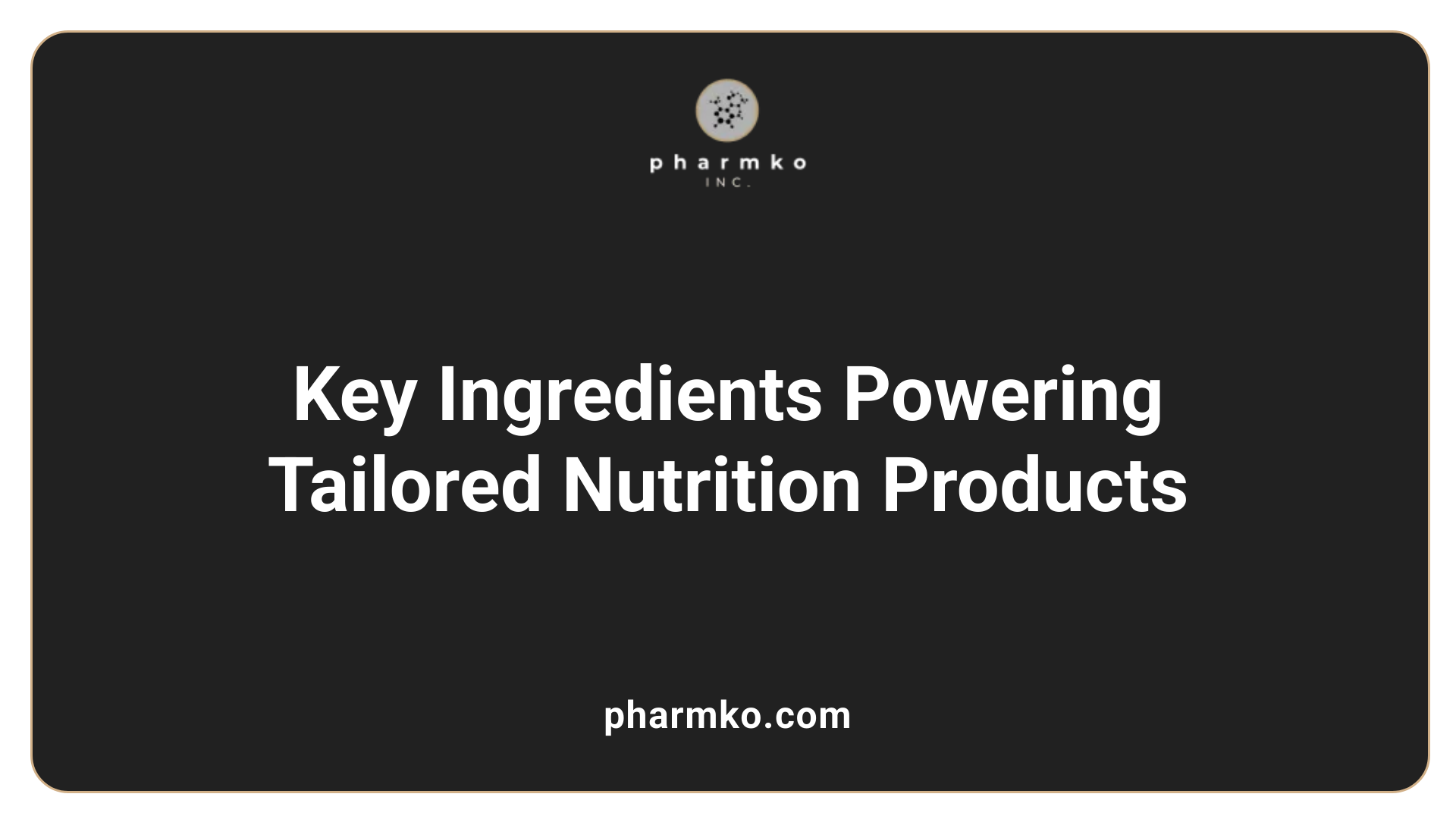
What ingredients are commonly used in customized nutritional products?
Customized nutritional products are specially formulated to support individual health needs, combining a variety of ingredients. These typically include vitamins, minerals, amino acids, and bioactive compounds that are selected based on personal health goals such as immune support, energy boost, or disease management.
In addition to traditional nutrients, many products incorporate natural, modified, or functional ingredients. Examples include herbal extracts, enzymes, and other bioactive components created through advanced technologies like cellular agriculture or fermentation processes. These innovations enhance the bioavailability and targeted action of the nutrients.
The raw materials used in these formulations are sourced from verified, global vendors. Once received, they undergo strict testing procedures to ensure safety and quality. Testing methods include high-performance liquid chromatography (HPLC) for identifying compounds, Fourier-transform infrared spectroscopy (FT-IR) for authenticity, and inductively coupled plasma mass spectrometry (ICP-MS) for detecting heavy metals.
Manufacturing standards and testing procedures
Manufacturing of customized nutrition involves several rigorous steps. Initially, raw materials are tested to confirm their identity, potency, and microbiological safety. This is followed by formula development and pilot batching to ensure consistency. Subsequently, the finished products undergo comprehensive testing to verify that they meet defined specifications before distribution. Compliance with standards such as Good Manufacturing Practices (GMP), United States Pharmacopeia (USP), or NSF International ensures products are safe, effective, and of high quality.
Special formats and modular supplements
Innovative formats include modular supplements which combine specific nutrients and herbal extracts designed for targeted health outcomes. Personalized approaches often leverage this modularity to tailor products to individual genetic profiles, lifestyle, and nutritional deficiencies.
This detailed blend of ingredients, rigorous processing, and high manufacturing standards helps deliver safe, effective, and personalized nutrition solutions.
| Ingredient Type | Common Examples | Purpose/Use |
|---|---|---|
| Vitamins | A, B-complex, C, D, E | Support immune function, energy, overall health |
| Minerals | Zinc, magnesium, iron | Mineral balance, metabolic support |
| Amino Acids | L-glutamine, lysine, arginine | Muscle repair, metabolic pathways |
| Bioactive Compounds | Omega-3 fatty acids, plant extracts | Anti-inflammatory, cardiovascular health |
| Functional Ingredients | Enzymes, probiotics, herbal extracts | Improve digestion, immunity, targeted health benefits |
This technical yet personalized approach ensures that each nutritional product contributes effectively to individual health optimization.
Clinical and Scientific Foundations Supporting Personalized Nutrition
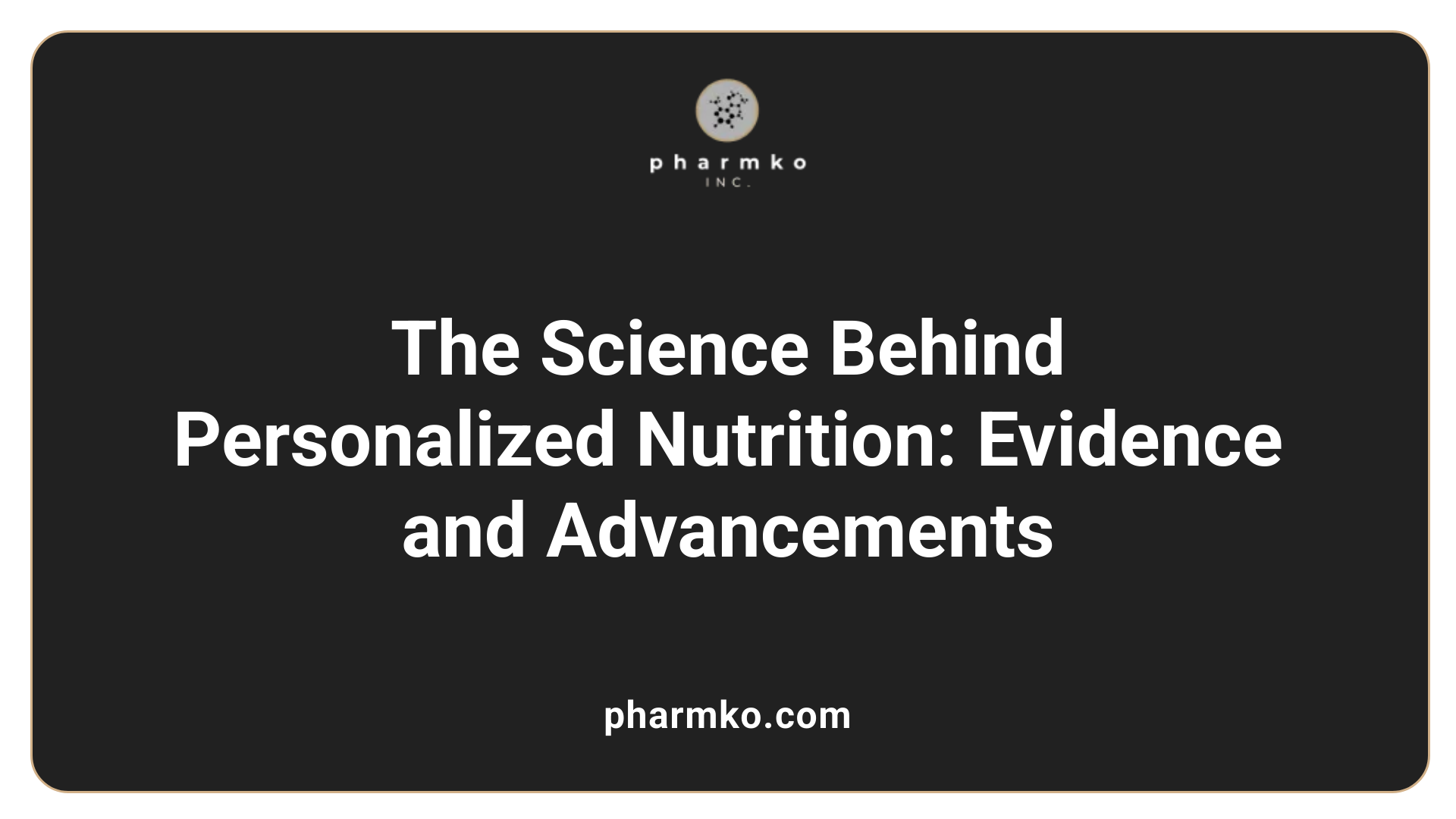
What scientific research supports the effectiveness of personalized nutrition solutions?
Scientific investigations have consistently demonstrated the benefits of tailored nutritional strategies. Notably, large-scale clinical trials such as the Food4Me study have shown that individualized dietary advice results in greater improvements in diet quality and health markers than standard approaches. Participants receiving personalized guidance experienced significant changes in their behavioral patterns and metabolic health, including reductions in triglycerides, LDL cholesterol, and HbA1c levels.
Recent advances in the field center on the use of omics technologies—genomics, metabolomics, and microbiomics—to gain deeper insights into individual biological responses to nutrition. These tools enable precise profiling of genetic predispositions, metabolic pathways, and gut microbiome compositions that influence how individuals respond to different diets.
Systems biology approaches and computational modeling further enhance our understanding by integrating complex biological data. These models simulate how various factors interact within the body, helping to predict responses to specific dietary interventions.
The combined evidence from these scientific efforts underscores the importance of a personalized approach. By considering genetic, phenotypic, and microbiome profiles, personalized nutrition can be optimized to improve health outcomes and prevent disease.
In summary, ongoing research supports that tailored nutrition solutions—grounded in clinical evidence and advanced biological analysis—are effective tools for promoting health and addressing individual variability in dietary responses.
| Evidence Source | Contributions | Additional Details |
|---|---|---|
| Food4Me Study | Showed improved diet and health markers | Randomized controlled trial demonstrating benefits of personalized advice |
| Omics Technologies | Enabled individual response profiling | Includes genomics, metabolomics, and microbiome analyses |
| Systems Biology Models | Predicted dietary response | Integrate biological data for personalized recommendations |
Understanding these scientific foundations affirms the growing importance of personalized nutrition in clinical practice and health management.
The Role of Healthcare Professionals in Personal Nutrition Management
What is the role of healthcare professionals in creating and managing personalized nutrition formulations?
Healthcare professionals, especially pharmacists, play a vital role in customizing nutrition plans for individual patients. They assess key factors such as the patient’s clinical condition, nutritional needs, and medication profile. This step ensures that the nutrition formulation aligns with the patient’s health status and treatment goals.
A collaborative approach is essential. Healthcare providers—clinicians, nutritionists, dietitians, and speech therapists—work together to select the most appropriate nutritional products. For instance, in complex cases like COVID-19 or for patients unable to take oral feeds, specialized formulations might be necessary.
Pharmacists are integral to this process. They prepare and verify the safety, efficacy, and quality of nutritional formulations. Modern advancements have introduced innovative products such as
| Product | Features | Significance |
|---|---|---|
| Omegaven | Fish oil lipid emulsion for pediatric PNAC | First approved in the US for pediatric patients, previously only available for compassionate use |
| Kabiven/Perikabiven | 3-chamber bag for adult PN | Simplifies delivery and enhances safety |
| SMOFlipid | 4-oil lipid emulsion for adults and children | Supports safety and efficacy across age groups |
| Intralipid | Soybean oil-based emulsion | Used since 1962, with over 200 million infusions worldwide |
These innovations illustrate the ongoing improvements in parenteral nutrition, ensuring safer and more effective treatments.
Beyond formulation preparation, healthcare professionals educate patients about their nutritional care. They provide dietary counseling tailored to individual health conditions and medications, helping optimize health outcomes. Understanding interactions between medications and nutrition is also crucial for preventing adverse effects and ensuring the effectiveness of therapies.
In summary, healthcare professionals are central to designing, preparing, and managing personalized nutrition plans. Their expertise enhances overall patient care by integrating nutritional strategies with medical treatment, thereby supporting recovery, disease management, and prevention.
Commercial and Market Innovations in Nutrition Formulations
Introduction of innovative delivery systems such as multi-chamber bags and advanced lipid emulsions
Pharmko has continually advanced the field of clinical nutrition through innovative delivery systems. One notable development is the introduction of the first 3-chamber bag for parenteral nutrition (PN) in adults, marketed as Kabiven and Perikabiven. These multi-chamber bags simplify the administration process, ensure compatibility of nutrients, and enhance safety by reducing the risk of contamination or errors during preparation.
Complementing these delivery systems are sophisticated lipid emulsions designed for diverse patient needs. The company produces SMOFlipid, a groundbreaking 4-oil lipid emulsion suitable for both adult and pediatric patients, including preterm neonates. This formulation provides a balanced combination of fats, supporting optimal health outcomes.
Previous and current approvals of products supporting pediatric and adult nutrition
Historically, lipid emulsions like Intralipid, derived from soybean oil, have been used worldwide since 1962, with over 200 million infusions administered globally. While Intralipid represented a significant step forward at the time, recent developments have focused on expanding the safety and efficacy profile of nutritional products.
In November 2018, Pharmko supported the approval of Omegaven, the first fish oil-based lipid emulsion specifically for pediatric patients with parenteral nutrition-associated cholestasis (PNAC) in the US. Before this, Omegaven was available solely for compassionate use, and its approval marked a major milestone in pediatric nutrition support.
Impact of clinical evidence on product development
The development of SmolFlip, the first 4-oil lipid emulsion approved for both adults and children in the US, exemplifies how clinical studies drive innovation. Supported by evidence confirming its safety and efficacy, this product has broadened the options for clinicians seeking effective lipid solutions for diverse patient populations.
This ongoing innovation reflects Pharmko's commitment to advancing clinical nutrition formulations and delivery methods, ultimately improving patient care and safety.
| Product Name | Application | Notable Features | Approval/Status |
|---|---|---|---|
| Kabiven/Perikabiven | Adult Parenteral Nutrition | 3-chamber bag for simplified, safe delivery | Approved |
| SMOFlipid | Adult & Pediatric Patients | 4-oil lipid emulsion, suitable for preterm neonates | Approved |
| Omegaven | Pediatric patients with PNAC | Fish oil lipid emulsion, first approved in US for this use | Approved |
| Intralipid | Global use since 1962 | Soybean oil-based, over 200 million infusions | Widely used |
Historical and Regulatory Milestones in Parenteral Nutrition
Support for previously unavailable formulations such as fish oil emulsions for pediatric patients
In the evolution of parenteral nutrition (PN), the development and approval of specialized lipid emulsions have significantly improved patient outcomes, especially among vulnerable groups like children. A notable breakthrough occurred in November 2018, when Fresenius Kabi supported the development of Omegaven, the first fish oil-based lipid emulsion approved for pediatric patients with PN-associated cholestasis (PNAC) in the United States.
Prior to this approval, Omegaven was only accessible through compassionate use programs, limiting its availability to a broader patient population. This milestone not only marked a transition from experimental or emergency use to formal medical approval but also provided clinicians with a new, safer nutritional option. The introduction of Omegaven helped reduce liver damage associated with traditional lipid sources, addressing a critical unmet medical need in pediatric care.
Additionally, Fresenius Kabi has pioneered innovations in PN administration. Their 3-chamber bags, such as Kabiven and Perikabiven, streamline the delivery of parenteral nutrition for adults, improving safety and ease of use. These pre-filled systems reduce the risk of contamination and dosing errors, representing a significant step forward in clinical practice.
For both children and adults, lipid emulsions have evolved further with the introduction of SMOFlipid, the first 4-oil blend approved for use in the U.S. for both age groups, including preterm neonates. Supported by clinical evidence confirming its safety and effectiveness, SMOFlipid offers a more balanced fatty acid profile, contributing to better clinical outcomes.
Since 1962, Intralipid, a soybean oil-based lipid emulsion, has been a staple in PN therapy. Its extensive use, with over 200 million infusions worldwide, laid the groundwork for the development of more advanced formulations like Omegaven and SMOFlipid.
| Product | Oil Composition | Year Approved | Notable Features | Suitable Patient Groups |
|---|---|---|---|---|
| Intralipid | Soybean oil | 1962 | Long history of use | Adults, children |
| Omegaven | Fish oil | 2018 | First approved fish oil emulsion for pediatrics | Pediatric PNAC patients |
| SMOFlipid | 4-oil blend | Recent | First multi-oil emulsion for all ages | Neonates, children, adults |
Understanding these milestones highlights the ongoing innovation in PN formulations, driven by support from companies like Fresenius Kabi, which continually improve safety, efficacy, and patient outcomes.
Regulatory approvals and safety assessments of lipid emulsions and PN systems
How do clinical evidence and regulatory standards influence product approval?
The development and approval of lipid emulsions and parenteral nutrition (PN) systems are heavily reliant on rigorous clinical evidence and adherence to regulatory standards. Clinical trials are essential in demonstrating that a product is safe, effective, and consistent in quality. For instance, SMOFlipid, a four-oil lipid emulsion suitable for both adults and children, including preterm neonates, received approval in the US based on clinical studies that provided strong evidence of its safety and efficacy.
Regulatory agencies such as the US Food and Drug Administration (FDA) evaluate this data extensively before granting approval. These agencies require compliance with strict manufacturing practices and safety protocols to ensure patient safety. Standards like Good Manufacturing Practice (GMP), United States Pharmacopeia (USP), and NSF International set quality benchmarks for production, significantly reducing the risk of contamination and variability.
Furthermore, innovations like Fresenius Kabi’s first three-chamber bag for adult PN, which simplifies delivery and enhances safety, are reviewed under these rigorous standards. Their support from clinical evidence ensures that the technology not only meets safety requirements but also offers tangible benefits in clinical settings.
Historically, the use of Intralipid, a soybean oil-based emulsion, since 1962, exemplifies the importance of long-term safety assessments. Over 200 million infusions worldwide attest to its safety profile, shaped by decades of clinical experience and regulatory oversight.
Standardization and safety protocols
Standardized formulations and protocols play a crucial role in maintaining high safety standards across the development and production of lipid emulsions and PN products. The approval of newer formulations like SMOFlipid reflects advances in evidence-based medicine, supporting their use across diverse patient groups. These practices help prevent complications and optimize nutritional support for vulnerable populations such as preterm neonates.
Ensuring the safety of these products involves continuous monitoring, post-market surveillance, and adherence to regulatory guidelines. This comprehensive approach underpins trust in the safety and effectiveness of lipid emulsions and PN systems used worldwide.
| Product Name | Use Cases | Regulatory Status | Notable Features |
|---|---|---|---|
| Intralipid | Adults | Approved since 1962 | Long history of safety, over 200 million infusions |
| Omegaven | Pediatric PNAC | Approved in US, Nov 2018 | Fish oil-based, for PN-associated cholestasis |
| Kabiven/Perikabiven | Adults | First 3-chamber bag | Simplifies administration, enhances safety |
| SMOFlipid | Adults & children | Approved based on clinical evidence | Four-oil formulation, safe for preterm neonates |
By combining robust clinical data with stringent regulatory standards, the safety and effectiveness of lipid emulsions and PN systems continue to improve, ultimately benefiting patient care worldwide.
Technological Advances Supporting Customized Nutrition
Are there technological innovations that enable advanced customization in nutrition formulations?
Yes, recent technological advancements have significantly enhanced the ability to customize nutrition for various patient needs. One major development is the introduction of modular supplements. These products contain specific nutrients or herbal extracts that can be combined in different proportions, allowing healthcare providers to tailor nutrition plans more precisely. For instance, clinicians can adjust vitamin, mineral, or amino acid content based on a patient’s unique requirements, improving outcomes and reducing waste.
Another important innovation is the integration of digital health systems. These systems collect and analyze data from patients in real time, such as blood nutrient levels, health status, and preferences. Using this information, sophisticated algorithms can recommend optimal nutrient combinations and adjust formulations dynamically. This level of personalization ensures that nutritional support can respond swiftly to changes in a patient’s condition.
Such technologies also enable the use of smart delivery systems. For example, advanced parenteral nutrition (PN) methods now include multi-chamber bags that can be customized on the spot, reducing preparation errors and increasing safety. The combination of modular components and digital integration creates a more responsive, precise approach to nutritional therapy.
Examples of technological impact in clinical nutrition include:
| Innovation | Description | Benefits |
|---|---|---|
| Modular supplements | Specific nutrients combined as needed | Flexibility, targeted nutrition |
| Digital health integration | Data-driven personalization | Responsive adjustments, improved outcomes |
| Multi-chamber bags | Customized delivery | Safety, efficiency |
As technology continues to evolve, it opens new horizons for tailored nutrition, improving health outcomes across diverse patient populations.
How does this transformation impact patient care?
The shift toward technology-driven customization allows healthcare providers to deliver more precise and effective nutrition plans. It minimizes the risk of over- or under-nutrition, enhances safety, and reduces complications associated with generic formulations. Overall, these innovations are transforming nutritional support into a dynamic, patient-centric practice, ultimately fostering better health management.
The Significance of Continuous Improvement and Scientific Validation
Why is scientific validation and ongoing research important in personalized nutrition?
In the realm of personalized nutrition, scientific validation and continuous research are fundamental to ensuring that products are both safe and effective. As nutritional science advances, new formulations and innovations must undergo rigorous testing to confirm their benefits and safety for diverse patient populations.
Fresenius Kabi exemplifies this commitment through its ongoing development of groundbreaking products. For instance, the approval of Omegaven in November 2018 marked a milestone, offering a fish oil lipid emulsion tailored for pediatric patients with PNAC. Prior to this, such treatment was only accessible through compassionate care, highlighting the importance of evidence-based development.
Moreover, the company’s innovation in parenteral nutrition delivery—such as the first 3-chamber bag for adults—aims to simplify procedures and enhance safety. These improvements are backed by scientific research that validates the technology and formulation.
Fresenius Kabi also produces SMOFlipid, the first 4-oil lipid emulsion approved in the US for both adult and pediatric use, including preterm neonates. Its safety and effectiveness are supported by clinical evidence, reinforcing the importance of ongoing validation in personalized approaches.
Transparent handling of data is crucial for building trust with healthcare providers and patients. Clear, accessible information about formulation processes and research outcomes ensures confidence in innovative nutritional therapies.
Continuous advancements depend on ongoing research, which not only enhances product efficacy but also adapts to emerging scientific insights. This dynamic process supports the evolution of personalized nutrition, ensuring that it remains aligned with the latest evidence and best practices.
| Aspect | Description | Example |
|---|---|---|
| Research & Validation | Ensures safety and efficacy of products | Approval of Omegaven, SMOFlipid |
| Transparency | Builds trust through clear data sharing | Formulation disclosures |
| Innovation | Driven by latest scientific findings | 3-chamber PN bags |
| Patient Safety | Focused on reducing risks | Use in preterm neonates |
Fresenius Kabi’s dedication to these principles highlights the vital role that ongoing research and transparent validation play in advancing personalized nutrition. As this field evolves, continued efforts in research and data integrity will be essential for developing safe, effective, and innovative solutions for diverse patient needs.
Future Perspectives and Emerging Trends in Personalized Nutrition
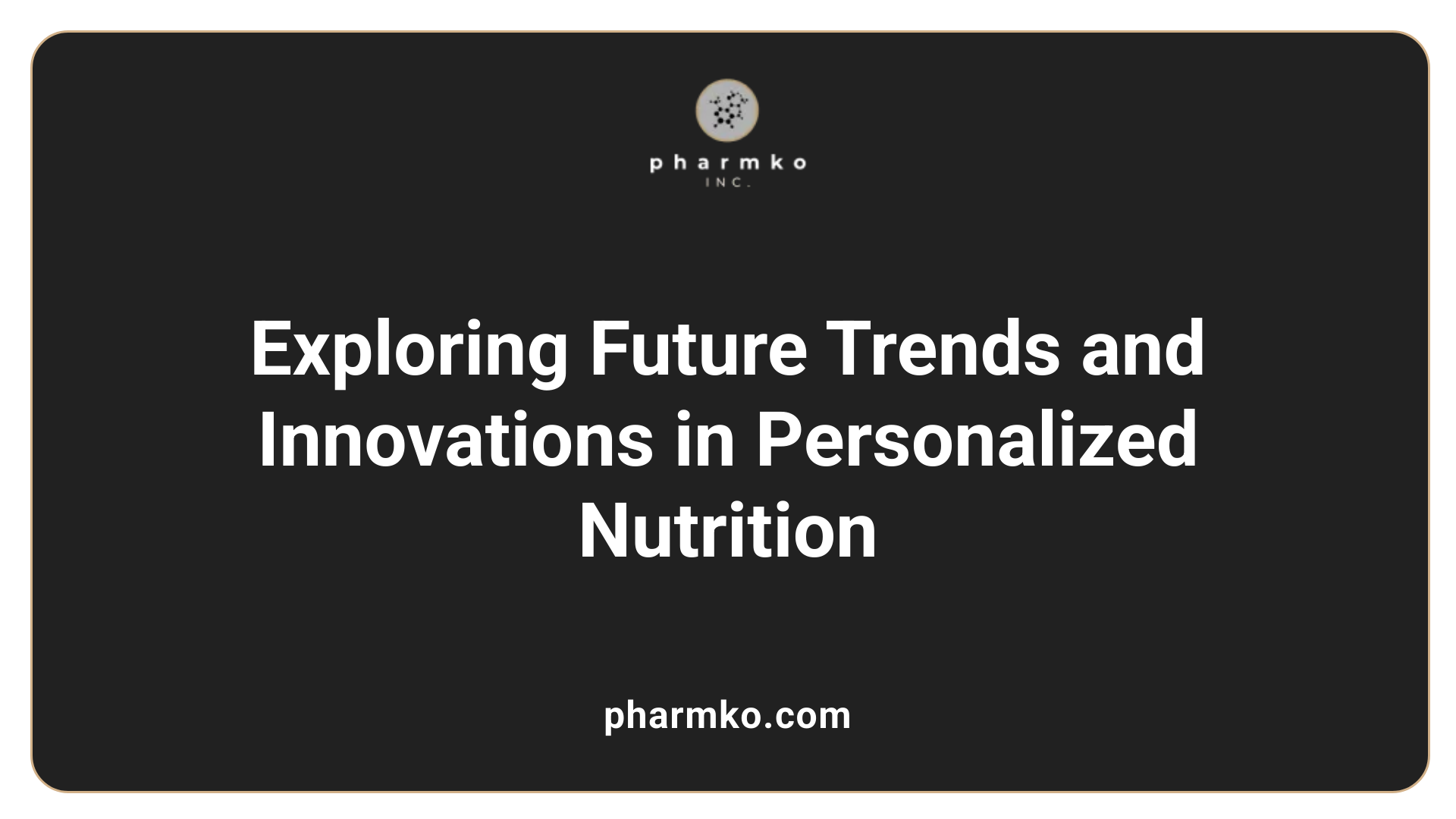
What are future trends shaping personalized nutrition?
The field of personalized nutrition is rapidly evolving, driven by technological innovations and expanding research. A significant trend is the integration of artificial intelligence (AI) and machine learning into nutritional planning. These advanced technologies enable more accurate formulation of individualized diets by analyzing vast amounts of health data, predicting health outcomes, and tailoring interventions accordingly.
Real-time monitoring is also becoming more sophisticated with the integration of wearable health devices. These gadgets continuously track vital signs and metabolic indicators, allowing for dynamic adjustments to nutrition plans based on an individual’s current condition.
Both human and veterinary medicine are benefitting from these advancements. In veterinary nutrition, the development of tailored diets for animals—such as personalized plans for pets—will complement broader trends seen in human health. This crossover highlights a future where precise, personalized nutrition supports health and well-being across species.
Advances in targeted formulations
New formulations are emerging, such as specialized lipid emulsions. Examples include Fresenius Kabi’s Omegaven, the first fish oil-based lipid emulsion approved for pediatric patients with PNAC (parenteral nutrition-associated cholestasis) in the US. Previously, this treatment was only available through compassionate use.
Another innovation is the 3-chamber bag for parenteral nutrition (PKabiven or Perikabiven), simplifying the delivery process and creating safer, more efficient nutrient administration for adults.
In addition, SMOFlipid stands out as the first 4-oil lipid emulsion approved in the US for both adults and children, including preterm neonates. Its safety and effectiveness are backed by clinical evidence, demonstrating ongoing progress in developing targeted, safe nutritional options.
Broader impact on healthcare
These developments reflect a trajectory towards more personalized, safe, and effective nutritional therapies. As research progresses, expect to see broader adoption of such tailored solutions and real-time health management tools.
| Innovation | Description | Impact |
|---|---|---|
| AI & Machine Learning | Personalized diet optimization through data analysis | More accurate, predictive nutritional plans |
| Wearable Devices | Real-time health monitoring and dynamic adjustments | Immediate response to changing health needs |
| Advanced Lipid Emulsions | Specialized nutrient formulations for various populations | Improved safety and efficacy for vulnerable groups |
These trends collectively point towards a future where nutrition is not just generalized but precisely tailored, improving health outcomes and quality of life across human and veterinary care.
Harnessing Science and Technology for a Healthier Future
Pharmko's commitment to innovation, scientific validation, and personalized approaches positions it at the forefront of nutrition therapy. As research progresses and technology evolves, tailored nutrition will become increasingly effective, accessible, and integral to holistic health management, benefiting humans and animals alike.
References
- PN Portfolio | PN Products From Fresenius Kabi
- Paving the way to better population health through personalised ...
- Guiding Principles for the Implementation of Personalized Nutrition ...
- Effects of a personalized nutrition program on cardiometabolic health
- Challenges in Personalized Nutrition and Health - PMC
- Clinical nutrition and the role of hospital pharmacist in the ...
- The Intersection of Nutrition and Pharmacy in Patient Care
- Pharmacists Play an Important Role in Nutrition Education













